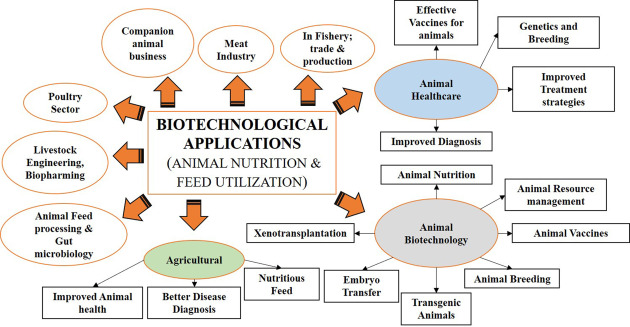Advancements in Animal Nutrition: Impact on Health and Sustainability
Dr. Juli Chakma1; Dr. Divyaprakash R. Choravada2
- Division of Animal Nutrition, ICAR-IVRI
- Division of Biochemistry, ICAR-IVRI
E-mail: julichakma2298@gmail.com
Abstract:
This article explores recent advancements in animal nutrition, emphasizing their impact on health and sustainability. Drawing on key studies, including those by Beever and Drackley (2012), Pinotti et al. (2014), Colman et al. (2011), Bertoni (2021), and Sahoo (2020), the discussion delves into the critical interplay between physical nutrition, technological innovations, and the broader implications for human, animal, and planetary health. The importance of optimal feed conversion efficiency, the role of nutrition in designing quality animal-derived foods, and the economic and environmental benefits of technology in dairy cow nutrition are highlighted. This comprehensive review underscores the need for a holistic approach to animal nutrition for the betterment of individual animals, agricultural practices, and global sustainability.
Introduction: In recent years, research in animal nutrition has made significant strides in understanding the critical link between proper feeding practices and optimal health in various species. This article explores key studies and findings that highlight the importance of nutrition in promoting animal health and sustainable production.
Body:
Beever and Drackley (2012) emphasize the importance of physical nutrition in achieving optimal rumen health and feed conversion efficiency. Their work underscores the need to consider not only the composition of animal diets but also the physical characteristics of feed.
Pinotti et al. (2014) delve into the role of animal nutrition in designing foods of animal origin. The authors, through the COST Action Feed for Health, stress the significance of nutrition in shaping the quality of animal-derived products. Their comprehensive review extends to considerations of animal welfare and sustainability.
Colman et al. (2011) bring attention to the benefits gained from technology in dairy cow nutrition. Their study explores the economic, environmental, and animal health advantages that arise from advancements in feeding practices. The integration of technology, according to the authors, contributes to enhanced overall efficiency in dairy production.
Bertoni (2021) takes a holistic approach, emphasizing the interconnectedness of human, animal, and planetary health. This comprehensive perspective aligns with the growing recognition that sustainable practices in animal agriculture play a pivotal role in promoting the well-being of both animals and the environment.
Sahoo (2020) shifts the focus towards clinical nutrition and therapeutic diets in farm animal practice. The author explores new opportunities that arise from advancements in this field, shedding light on the potential for improved health outcomes and disease management in farm animals.
Conclusion: In conclusion, the collective body of research showcased in these studies underscores the critical role of nutrition in animal health, production efficiency, and overall sustainability. As we move forward, integrating these insights into practical feeding strategies becomes imperative, not only for the benefit of individual animals but also for the well-being of our planet and the consumers of animal-derived products. Advances in animal nutrition contribute to a more holistic and sustainable approach to agriculture, aligning with the evolving needs of our interconnected world.
References:
- Beever, D. E., & Drackley, J. K. (2012). Feeding for optimal rumen and animal health and optimal feed conversion efficiency: the importance of physical nutrition. Optimization of Feed Use Efficiency in Ruminant Production Systems, 75.
- Pinotti, L., Krogdahl, A., Givens, I., Knight, C., Baldi, A., Baeten, V., … & Luten, J. (2014). The role of animal nutrition in designing optimal foods of animal origin as reviewed by the COST Action Feed for Health (FA0802). Biotechnologie, agronomie, société et environnement, 18(4), 471-479.
- Colman, D. R., Beever, D. E., Jolly, R. W., & Drackley, J. K. (2011). Gaining from technology for improved dairy cow nutrition: Economic, environmental, and animal health benefits. The Professional Animal Scientist, 27(6), 505-517.
- Bertoni, G. (2021). Human, Animal and Planet Health for Complete Sustainability. Animals, 11(5), 1301.
- Sahoo, A. (2020). Clinical nutrition and therapeutic diets: new opportunities in farm animal practice. EC Veterinary Science, 5(4), 12-29.



